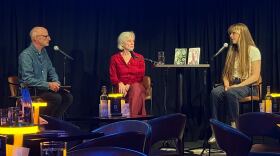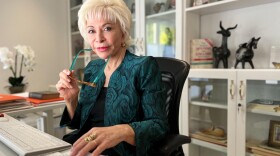Judson Hale is best known for his a half century at Yankee Magazine and a long tenure as editor of The Old Farmer’s Almanac.
But Judson Hale's story is much more than magazines.
In his memoir, The Education of a Yankee, he describes being brought up first in the well-to-do parts of Boston, and then in very rural Maine. He writes about his colorful career at Dartmouth College, his time in the military, and how he became a sort of spokesperson for the spirit of the region.
The Education of a Yankee was first published in 1987 and has just been re-released. Weekend Edition spoke with Judson Hale ahead of his appearance this Thursday, May 28th, at Gibson’s Bookstore in Concord.
I thought maybe I'd be [at Yankee] for six months, maybe, and then go back to New York or Boston and get what my mother referred to as a real job. But I think it was within a few weeks that I began to think, I love it here... I felt like I was sort of coming home.
On whether a Yankee can still be described as, in the words of one acquaintance, “a man who ain’t leanin’ on nothin’”:
“I think so, yes… there’s a sense of independence I think of with New Englanders. Winters make us tough. The landscape is part of our whole mystery. My uncle started Yankee Magazine in 1935 and we’re about to celebrate our 80th anniversary. But in the very first issue, he said, Yankee is the expression and, perhaps, indirectly, the preservation of our New England culture. I always liked that because I always felt every issue was attempting to define that culture.”
On what being hired at Yankee Magazine meant to him in September 1958:
“It meant a job. I had three years driving a tank – I had been with the 3rd Armored Division. I said, well, I’d majored in English at Dartmouth, and I could drive an M47 and an M48 tank. Nobody was interested in that at all. So my mother suggested, why don’t you write my brother, Rob Sagendorph, he runs a little magazine up in New Hampshire? I have the letter from Rob Sagendorph, saying I have this little opening.
“I thought maybe I’d be there for six months, maybe, and then go back to New York or Boston and get what my mother referred to as a real job. But I think it was within a few weeks that I began to think, I love it here. I was brought up in a small town in Maine, a little town nobody’s ever heard of. It’s called Vanceboro, up 110 miles northeast of Bangor, Maine. I got to Dublin; my wife and I rented a house, and I felt like I was sort of coming home.”

On his early upbringing in Boston’s upper class, and the “detour” into life in rural Maine:
“I would’ve stayed in Boston, probably, and worked for Sokolow Machinery or something. But then my brother changed everything. When he was three years – his name was Drake – he walked into my father’s home office and started to scream and hit himself. He did that for a year; they took him around everywhere.
“Autism had not been defined; even the word didn’t exist in those days. Doctors here just said that he should be locked up – in those days, that’s what you did. And finally, my mother, through my grandmother and an English friend, heard of this place in Switzerland started by a man named Rudolf Steiner, who established what’s called anthroposophy, which is a philosophy involving farming, religion, architecture, you name it.
“There was a place there for people like my brother. So my mother and father took my brother Drake across on the S.S. Cleveland in 1928, and he seemed to respond well. [They decided] we’ll keep him there another year, and my mother was exposed to what we call anthroposophy. They decided, the two of them, to leave everything in Boston, and to start an anthroposophical center up in that little town of Vanceboro.
“[They] built up a farm, a theater – my dad had 12,000 acres, probably bought it at about a dollar an acre, and ran into the lumber business. The book, The Education of a Yankee, is about that wonderful adventure that my mother always felt failed because they eventually went bankrupt. I always felt it was a huge triumph.
“When people say, well, do you think you’ll ever go to heaven? I’ve been to heaven. Heaven was Vanceboro, Maine.”
If I’m not making other people laugh, I make myself laugh... Humor has been part of my life, and it’s part of my individuality.
On his mother’s advice that he was too young to write his memoir in 1986:
“She was right, of course. She was always right. It was very annoying!”
On whether the “frugal Yankee” tradition is disappearing as it becomes less necessary for many people:
“We’re always saying we’re losing this and that. Sixty or seventy years from now, my grandchildren will consider today the good old days. That’s the way it is, every year. When people get old, that’s how they talk; that’s how they feel. That’s how they think.
“I don’t go along with that. I don’t regret everything that’s gone by; I think things are better now, in many ways. We don’t have ten-year-olds working in the factories. We don’t have segregation to the extent that it was back then. Modern medicine allows us to live longer. This is a wonderful time.
“Eventually our grandchildren will say this was the best time. And their grandchildren will say the time they’re living in was the good old days. And so it goes.”
On how he sees himself:
“I’m the one in the mirror. If I’m not making other people laugh, I make myself laugh. I hesitate sometimes to say the joke, because it’s so stupid, but it makes me laugh – you know, asking direction jokes. Can you tell me how to get to Bellows Falls? Well, if I was to go to Bellows Falls, I don’t believe I’d start from here. That sort of thing.
“Humor has been part of my life, and it’s part of my individuality one way or another. There’s some sadness there. My father committed suicide, and how my wife dealt with the alcohol, that’s not a laughing matter. Although we can find ways to laugh – Mel Brooks found humor in the Holocaust. You can find humor in anything in the right circumstances, and I’m always searching for humor in every circumstance.”







